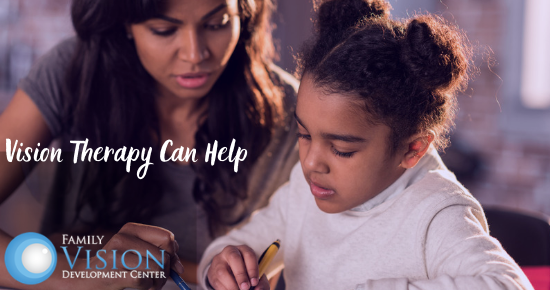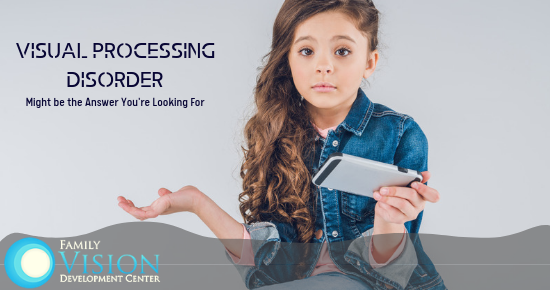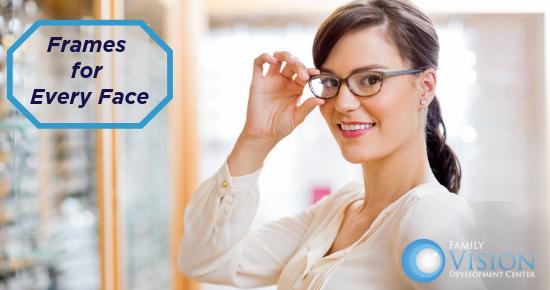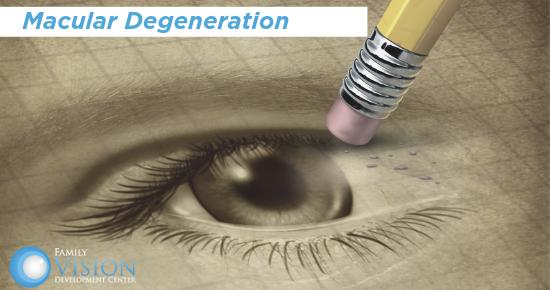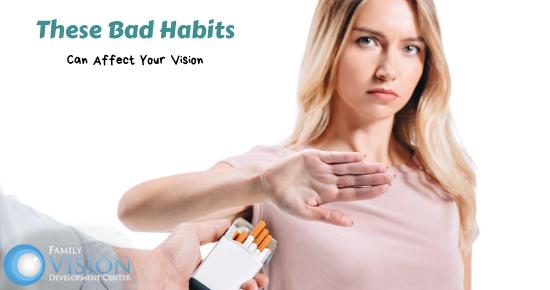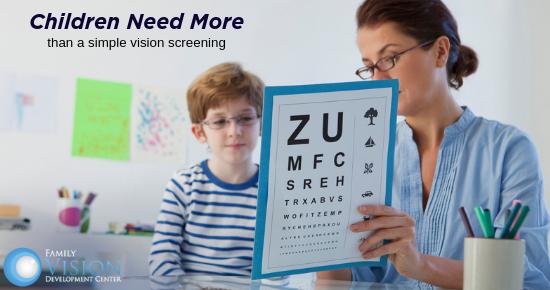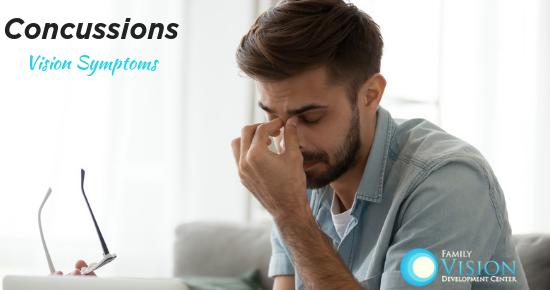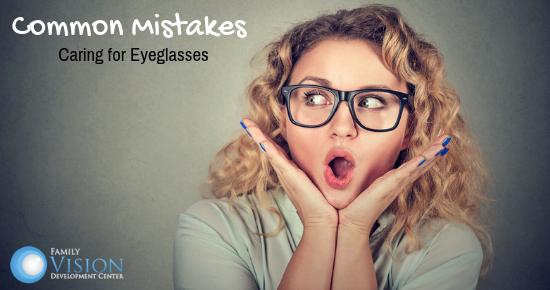Discovering that your child has a vision disorder can be frustrating and overwhelming. You may see them struggling with everyday activities and want to do everything you can to help get the problem corrected. Vision Therapy is a type of visual training (like physical therapy for the eyes and brain) that uses a series of eye exercises to recover normal visual skills. It is very successful for treating many types of vision disorders including amplyopia (lazy eye), crossing eyes, visual tracking issues, focusing or convergence issues, or visual impairment due to a concussion or traumatic injury.
If you are considering Vision Therapy as an option, but are not sure if it is right for your child, read about these parents’ experiences after bringing their kids to Dr. Martin at the Family Vision Development Center in Aurora.
Vision Therapy Can Help With School Struggles
Prior to vision therapy, our son struggled in school. He avoided reading and anything that had to do with writing. Homework was a nightmare and very stressful on the household.
Since he has completed the vision therapy program, school has become easier & he no longer needs reading programs. If it wasn’t for Dr. Martin & his team, I believe things would have progressively got worse.
–Parent of C.C.
Before we started Vision Therapy, getting our daughter to do homework was a nightmare! No first grader should have to sit at the table for nearly an hour writing ten words. She was diagnosed with ADHD because of this lack of focus.
I learned about Vision Therapy and decided to go forward with it. The last few weeks really opened the door for her – she’s reading chapter books! She is blazing thru her math problems & she’s gotten more coordinated physically.
I am SO GLAD we found Dr. Martin while she’s this young – the future is now firmly in her own hands.
–Parent of A.H.
Thanks for all of your work with our son! He’s reading at grade level now and he gets more work done at school so he’s bringing home less homework!
–Parent of R.J.M.
Vision Therapy Can Bring the Joy Back to Reading
Thanks to the whole Family Vision team! My daughter is now an avid reader who is happy to pick up a book! What a change 6 months can make.
–Parent of M.H.
Thank you Family Vision for helping my son. He has been improving on his grades in school because he can now focus better. I think his concentration and being able to retain information has improved as well.
I was most excited when I saw him actually reading a book for fun! That never happened before!
–Parent of B.M.
Vision Therapy Can Improve Quality of Life
What an amazing life changing journey this has been for not only our son, but for us as well!
Before Vision Therapy, he struggled for years in school. Every evening there was homework for hours. His self-confidence was very low.
From the beginning, Dr. Martin & staff had a goal for him that no one else thought he was capable of. We cannot thank you enough for opening so many doors that were shut before.
Love you guys!
–Parent of H.S.
The Family Vision Team Really Cares
We’re very happy for our son’s therapy results! Dr. Martin put together a fantastic team to make it happen & make it a pleasant experience each week.
The environment is very positive – we really appreciate the knowledge, patience, & professionalism that Dr. Martin, Kim, & Nancy have demonstrated. We would recommend the team to anyone who needs a good, efficient, & cost-effective eye therapy.
–Parent of C.Y.
Vision Therapy may not be the right choice for every child, but Dr. Martin will do a comprehensive eye health and vision evaluation before starting any treatments in order to develop the most effective treatment plan for your child. Contact us at 630-862-2020 or request an appointment online to speak with our team and learn more about our advanced Vision Therapy services.
Family Vision Development Center carries an extensive line of designer glasses in order to offer our clients the very best selection, no matter your face shape, preferences or lifestyle. And we are proud to carry two top-quality brands that you won’t find at many other offices in the area.
Maui Jim
When it comes to quality eyewear, it doesn’t get much better than Maui Jim. You might know them best for their sleek sunglasses, but that’s not all they do. Their MauiPassport prescription lenses offer edge-to-edge clarity you won’t find in other brands. Their state of the art technology and lens design delivers the widest possible field of view, while eliminating 99.9% of glare, enhancing color and contrast and promoting eye health.
Maui Jim eyeglasses are available in stylish designs with exclusive lens technology that truly enhances your daily vision. Each pair comes with features like scratch-resistant, anti-reflective and advanced hydrophobic coatings, as well as 100% UV protection. Other features are also available to suit your specific needs, and your vision experts at Family Vision Development Center will help you select the perfect pair.
Nike Vision
You may not immediately associate the Nike brand with designer glasses, but who is better to develop quality eyewear for active people than a leader in the sports industry? Nike understands quality and durability and it shows in their extensive line of eyeglasses and sunglasses perfect for the elite athlete.
Nike prescription glasses and sunglasses come in a wide variety of shapes, colors and materials to suit any lifestyle while staying on trend for both men and women. And keeping athletes in mind, their cutting-edge technology allows for maximum performance in your sport of choice with virtually distortion-free optics. Frames are available with features like integrated spring hinges, rubberized nose pads, adjustable frame features and materials like titanium, lightweight plastic and Flexon memory metal.
Visit Family Vision Development Center in Aurora to see our full line of designer glasses and sunglasses, including Maui Jim and Nike. It is important to consider materials, designs and coatings before making your final selection, and we are here to help you make the best choice. Contact us at 630-862-2020 or request an appointment online.
Unlike problems that involve actual eyesight or sharpness of vision, visual processing disorders affect how visual information is processed by the brain. A child may have 20/20 vision, but still struggle with processing things like symbols, pictures or distances. Visual processing disorders can hinder a child’s ability to learn properly in the classroom and can also present challenges while playing sports or socializing with peers, all of which can have a negative effect on their self-esteem.
Signs of Visual Processing Disorder
There are certain signs or symptoms to watch for that would indicate that a child may have trouble with visual processing. These could include:
- Difficulty distinguishing between similar letters, shapes or objects.
- Difficulty distinguishing a figure from its background
- Tendency to skip lines when reading, or read the same line over and over
- Trouble writing within the lines, copying from a book or bumping into things when walking
- Trouble remembering what they’ve seen or read
- Difficulty determining how close objects are to each other
- Difficulty identifying an object when only parts of the object are showing
- Frequent reversal of numbers, letters or words
- Organization problems
- Untidy handwriting
- Poor retention of visual classroom material
Vision Therapy is One Treatment Option
Vision therapy is a kind of physical therapy for the visual system which includes the eyes and brain, and can produce successful results for correcting visual processing disorders. In-office, one-on-one vision therapy treatments can improve visual processing speed, visual memory, visual-motor integration and more in order to improve a child’s visual processing issues and in turn help them to improve in the classroom, on the field, and with their peers.
Family Vision Development Center’s Dr. Martin has focused extensively on vision therapy techniques and applies his expertise and understanding of this form of vision treatment to his clients of all ages. Contact us at 630-862-2020 or click here to schedule an appointment where Dr. Martin can thoroughly evaluate your vision issues and determine the most effective treatment options.
Additional information can be referenced here
When shopping for new eyeglasses, there are often so many styles, colors and shapes to pick from that it’s hard to know which pair to choose. Do you go with the latest style in the hottest new color that everyone is wearing now, or do you stick with a more classic choice that will stand the test of time? If you really want eyeglasses that will make you look and feel fantastic, you should make sure they are perfectly suited to your face. Here’s how you can accomplish that.
Eyeglasses Should Match Your Face Shape
Faces come in five basic shapes, and paying attention to which category your face most resembles can help you decide on the right kind of frames.
- Round – Choose frames that are rectangular or square, as they tend to make a face look slimmer and longer
- Square – Oval or round frames will help balance the angular features of this face shape
- Heart – Frames that are wider at the bottom will offset the wider forehead of this face shape, adding width to the narrower part of the face. Rounded frames can also be flattering here.
- Oval – Stick with frames that are wider than the broadest part of your face, that are not overly large, to maintain the symmetry of an oval face
- Diamond – Compliment a narrow forehead and chin by choosing frames that are wider than the cheekbones, such as cat eye or oval styles
Match Your Eyeglasses To Your Skin Tone
Eyeglasses come in many different colors, so figure out what your skin tone is and choose your frames to compliment your tone.
- Warm skin tone – a yellow or golden cast to your skin indicates a warm tone and is best complimented by shades of brown, gold or honey, as well as olive green, light tortoise, warm blue or red.
- Cool skin tone – these skin tones are indicated by pink or blue undertones and tend to look best in silver, black, gray, shades of pink or purple, jade and darker tortoise.
These are just suggestions, of course. Your favorite pair may not fall into any of these categories and that’s perfectly fine. As long as you feel great in your glasses, that’s all that matters!
Family Vision Development Center has a wide variety of great styles and colors to choose from in our state-of-the-art optical center. Contact us at 630-862-2020 to meet with one of our optical specialists to select the perfect frames to enhance your vision, as well as your confidence.
Additional information referenced here
Chances are you know someone who has been diagnosed with macular degeneration, as it affects more than 10 million people in the US. Read below for an overview of this disease and how you can protect yourself from being affected.
What Is Macular Degeneration?
Also known as age-related macular degeneration, or AMD, it refers to a condition in which the central portion of the retina, called the macula, is damaged and causes a loss of central vision. In early stages, there may be no symptoms. But as it progresses, central vision deteriorates and a black spot begins to appear in the center field of vision – which affects a person’s ability to read, drive a car and focus on fine details. Unfortunately, there are no scientifically proven causes for this disease, but there are some generally agreed-upon risk factors that include both genetic and environmental factors.
What Are The Risk Factors For Developing AMD?
These are the most common risk factors associated with the development of macular degeneration:
- Age – Your risk increases with age, and is most common in those people age 50 and older
- Diet – People who are overweight or eat a diet high in saturated fats can increase their risk
- Race – Caucasians are more likely to develop AMD over any other race
- Smoking – This can DOUBLE your risk
- Family history – you are more at risk if even one other family member has been affected
Treatment Options
Currently there is no cure for macular degeneration, but there are ways to manage the disease. These options include nutritional therapy using combinations of nutritional supplements, laser surgery, or the use of anti-VEGF drugs which are injected into the eye through a thin needle.
Macular degeneration is diagnosed by your eye doctor, who will perform special tests to analyze your retina and macula. It is always best to be diagnosed as early as possible, in order to implement more effective management of the disease. Schedule your appointment at Family Vision Development Center in Aurora if you are currently experiencing any vision issues, or to stay current on your annual eye exam, which is crucial for maintaining proper eye health. Call our office at 630-862-2020 or use our online appointment request form to select one of our convenient appointment times.
Additional information referenced here and here
Bad habits are hard to break, that’s for sure. But it’s even harder when you don’t even realize that some things you do out of habit can actually be causing vision problems! Take care of your eyes and protect your vision by avoiding the following bad habits.
Going Outside Without Sunglasses
You might think that it’s not necessary to wear your sunglasses if you’re just going out for a quick trip. But being outside for even a few minutes without them is a bad habit and a bad idea. Sunglasses protect your eyes from the sun’s harmful UV rays, which can cause damage like cataracts, macular degeneration or even skin cancer on your eyelids.
Smoking
Everyone knows that smoking is considered to be a bad habit. But along with the MANY other dangers associated with smoking, it can also have harmful effects on your vision. The smoke and chemicals from tobacco can damage blood vessels in your eyes, affect tear production and reduce the amount of oxygen that gets to the eyes. Smoking has been linked to vision loss and a number of eye diseases.
Wearing Old Makeup
Yes, makeup is expensive, so you may be hesitant to throw it away if there’s anything left to use. But keeping it around could end up costing you your vision. Old makeup can grow harmful bacteria that can lead to a serious infection. Try to develop a habit of regularly checking the expiration dates on your cosmetics and getting rid of any makeup that is more than about 4 months old.
Wearing Contacts For Too Long
Many people who wear contacts are probably guilty of leaving them in for longer than they should for any number of reasons. Too tired to take them out? Forgot to bring your supplies with you? Trying to save money by extending the time you wear them? Get rid of these bad habits now! Wearing contacts for too long can significantly increase the risk of infection and can cause damage to your corneas.
Thinking You Don’t Need To Visit An Eye Doctor
Believing you are immune to vision problems is indeed a very bad habit. Nobody is invincible and eye conditions and diseases can happen to anyone. Just because you think your vision is fine, does NOT mean that’s actually the case. Many vision conditions do not show any symptoms in the early stages, so you don’t notice a problem until it is too late.
Always make time to see your eye doctor for regular comprehensive eye exams! It is the best way to ensure your eyes are getting the best care and that any potential issues are diagnosed early enough to start successful treatment. Call Family Vision Development Center today at 630-862-2020 for more information.
Referenced article here
We’re all told to get our eyes examined on a regular basis. And it might be common sense to think that the earlier a vision condition is detected, the better the chance of treating it. But is a comprehensive eye exam the only way to detect eye conditions? Is it really that different from a vision screening? Read on to discover why comprehensive eye exams really are so important, and what takes place during the appointment.
Eye Exam Vs Vision Screening
YES, there is a big difference between these two types of procedures. A vision screening is a very basic test that only assesses vision, while a comprehensive eye exam involves a number of tests to provide a complete evaluation of your vision as well as the health of your eyes.
What Happens During The Exam?
First and foremost, the optometrist will get a full patient background and history in order to discover any past or present medical conditions or allergies. The doctor will then use a variety of tests and procedures in order to assess the health and function of your eyes. This can include testing for visual acuity, or the sharpness of your vision, along with procedures that asses how your eyes work together, how well your eyes can follow a moving object or move between two objects, and if there is evidence of proper depth perception when looking at a 3D object.
The doctor may also use a number of different instruments to determine your exact prescription for eyeglasses, and will examine the structure of the eye, including the eyelids, cornea, iris, lens, retina and optic nerve, under high magnification, which can uncover a wide range of eye conditions or diseases.
Why Is A Comprehensive Eye Exam So Important?
Many eye conditions show no obvious symptoms in the beginning stages and can go undetected for a long time, therefore continuing to worsen and increasing the risk of permanent damage. Unlike a vision screening, a comprehensive eye exam is the only way to diagnose most types of eye diseases or conditions, such as amblyopia (lazy eye), nearsightedness, farsightedness, astigmatism, cataracts, macular degeneration or glaucoma, or even health issues such as diabetes, thyroid disease or cancer.
The earlier these conditions are diagnosed, the faster treatment can begin, and the more likely you are to protect your vision. Call Family Vision Development Center at 630-862-2020 to schedule your appointment in our Aurora office.
Related articles can be referenced here and here
A concussion, also called a mild traumatic brain injury, is caused by a bump, blow or jolt to the head or the body that is violent enough to cause the brain to hit the skull. A concussion can result in mild to severe damage, and should always be taken very seriously. Among the many problems that can be caused by a concussion, such as headache, disorientation or memory loss, vision can also be affected. Some of the most common eye problems can include:
Double Vision
Seeing blurred or double images can be a sign of serious damage after a concussion and should be evaluated immediately. Although not always life-threatening, double vision can still cause dizziness, poor balance and difficulty reading or walking. Once it has been determined that it is not a serious injury, the double vision should be treated or managed by your optometrist.
Light Sensitivity
Photophobia, or sensitivity to light, is another very common side effect of a concussion, as people often complain of discomfort when in bright sunlight or fluorescent lighting. This is thought to be a result of the brain’s inability to adjust to varying levels of light due to the concussion, and can linger long after the initial injury.
Eye Tracking
After a concussion, a person may experience small, quick eye movements which can cause problems when looking from one object to another, as well as when trying to track and focus on a moving object. Hand-eye coordination can also be compromised, leading to difficulty playing sports and in the classroom.
Convergence Insufficiency
Convergence insufficiency, another common result of a concussion, is an inward turning of the eyes and causes a person to have trouble focusing on objects that are close. They have difficulty using their eyes together for activities such as reading or working on a computer and often complain of eyestrain, headaches or an inability to concentrate.
Vision problems after a concussion can be debilitating. At Family Vision Development Center, we have extensive training in diagnosing and treating these conditions and more. Our comprehensive eye exams and advanced vision therapy treatments can help successfully restore your vision quickly and efficiently. Contact us at 630-862-2020 to make your appointment at the first sign of a possible concussion.
Referenced articles here and here
A new study has been released that indicates that Amblyopia can cause a child to suffer from low self-esteem. The findings of the study, which was published in the November 15thJAMA Ophthalmology, highlight the fact that children with Amblyopia had a lower self-perception of their social abilities, as well as their academic and athletic performance. Treating this eye condition can have a positive impact on a child’s vision as well as their quality of life.
What Is Amblyopia
Also referred to as “Lazy Eye”, Amblyopia is a common eye condition in children that occurs when the eyes and the brain do not work together properly, and results in poor vision in one eye, even with the use of proper glasses or contact lenses. Although a child may not even mention their symptoms to a parent, this study shows that it can have far deeper effects on a child’s life than just impaired vision.
Typical Symptoms
Indications of Amblyopia can include the more-obvious physical symptom of a “lazy eye” with one eye wandering in a different direction, as well as less-obvious signs such as squinting, poor depth perception or double vision. These symptoms can lead to poor performance in school due to slower reading or writing skills, and can inhibit motor skills, causing a child to have difficulty engaging effectively in sports activities. According to the study, all of this can result in a child experiencing a lower sense of self-esteem, as they compare themselves to their higher-performing peers.
Treatment With Vision Therapy
Vision therapy is an extremely effective form of treatment for Amblyopia and can be described as physical therapy for the visual system, which includes the brain and eyes. Using a series of eye exercises, it is possible to restore normal communication between the eyes and the brain, thus correcting the eye condition. When it comes to successfully treating Amblyopia, it is best to try to start as young as possible, although good results are possible at any age. Early detection is accomplished through comprehensive eye exams, which should begin as young as 6 months old.
Family Vision Development Center provides comprehensive eye care for the whole family. We believe that regular eye exams, starting at an early age, can prevent many eye diseases or can allow us to diagnose and treat them before they get worse. Call us at 630-862-2020 to learn more and to schedule an appointment.
Referenced article here
With the cost of a new pair of prescription eyeglasses, it is surprising how often people mistreat them. Not properly caring for your eyeglasses can lead to unintentional and unnecessary damage, or even the need for replacement, so follow these tips to help your eyeglasses stay protected.
What You Definitely Should Do
The best thing you can do for your glasses is to keep them clean. Keep the following things in mind in order to avoid scratching the lenses or causing other damage during the cleaning process:
- Make sure your hands are clean and free of dirt or oils
- Use lukewarm tap water and a drop of dishwashing liquid, and gently rub both sides of the lenses and frames
- Rinse thoroughly and shake to remove excess water
- Gently dry with a clean, soft microfiber cloth for best results
Besides regularly cleaning your eyeglasses, you can further protect them by keeping them stored in a hard case when not wearing them, keeping the lenses facing upward when laying them down, and remembering to put them on and remove them using both hands in order to avoid misaligning the frames.
What You Should Avoid Doing
Glasses don’t last forever, so to get the most life out of them you must stop abusing them! Here are some things that can damage your eyeglasses:
- Using your clothes to wipe the lenses – wiping your glasses on your shirt can scratch the lenses or leave lint behind
- Putting them on top of your head – this can stretch out the frames
- Falling asleep with them on – this may not be intentional, but it can also misalign the frames so try to remember to take them off when you lie down
- Using household glass cleaning products to clean them – the ingredients in these products can cause a lot of damage to the lenses
Visit Family Vision Development Center in Aurora for the best selection of designer eyewear and the most up-to-date lens technology. Along with your thorough eye exam, you will also receive complete instructions for the proper care of your new glasses. Call us at 630-862-2020 to schedule your appointment or use our convenient online scheduler.
Referenced articles here and here
